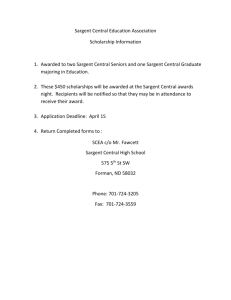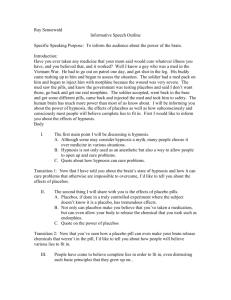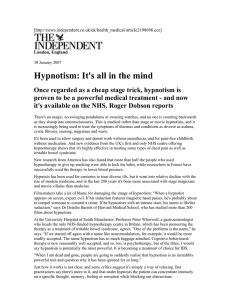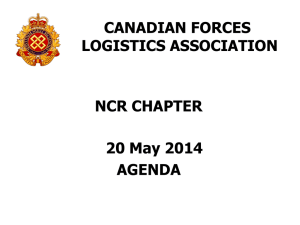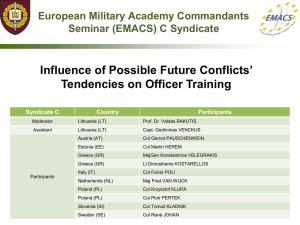The Second World War: Shellshock to Psychiatry
advertisement
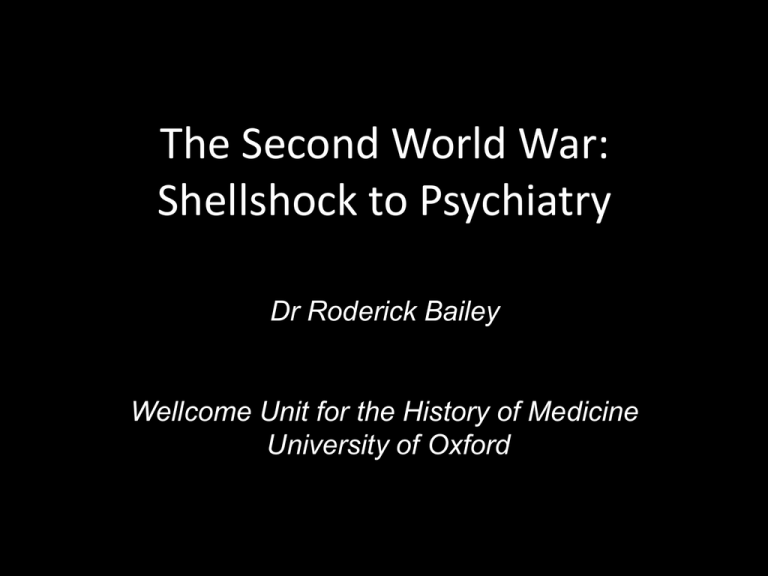
The Second World War: Shellshock to Psychiatry Dr Roderick Bailey Wellcome Unit for the History of Medicine University of Oxford DUNKIRK CURED BY SOLDIERS HYPNOTISM LONDON, July 30. - Soldiers back from Dunkirk have been cured of nervous disorders by means of hypnotism. Remarkable results were reported this week by Dr. William Sargent, well known London psychiatric specialist. One patient puzzled the doctor. With infinite care he took the man back to the frightfulness of the hours on the French beach. Still there was no clue that might provide a basis on which to formulate a cure. Then hypnotic treatment was tried. Under hypnosis the soldier – a nervous wreck – gave Dr. Sargent a clear picture of his ordeal on the beach beside his soldier brother. The brother was mortally wounded. The soldier, heart broken at the agony of his brother, shot him to hasten his death… TORTURED MIND. Back home, subconsciously he was torturing his mind about what he had done, though he could not remember except under hypnosis. Knowing all, the doctor was able to reassure the stricken man, who was quickly restored to health… Behind these stories of successful treatment lies a scheme which the British War Office has instituted to mobilise psychological experts throughout the country for this work. Shell shock exacted a heavy toll in the last war… Today… the most advanced treatment, including hypnotism, suggestion, and other forms of psychotherapy are used… They are [also] interested in prevention as well as cure. Every recruit undergoes a minor form of psycho-analysis at his medical examination to discover if he has any history or symptom of nervous disorder which might affect his discipline in the front line. Thus, men who might crack up under strain, or, as in the last war, might run the risk of being shot for cowardice – in reality due to some neurosis – will be found in time. SELECTION TREATMENT ‘Every form of psychotherapy was used, persuasion, suggestion, reeducation, analysis. On occasion a man might be ‘dressed down” in public, but at the same time another man would be singled out for praise and encouragement. Only the psychiatrist was permitted to use the more aggressive forms of persuasion, but in certain cases, it undoubtedly had the desired effect. ’ Lt Col Harold Palmer (1943) ‘In psychiatry, almost everything depends on the basic personality of the patient. Thus one can afford to evacuate a good man early, knowing that he will return to the unit with high morale, having clearly benefited from rest and treatment. The poorest human material is like a cheap car, which must be run to the limit and then discarded. The psychiatrist cannot make good fighting men out of inadequate individuals. These should be sent back [i.e. evacuated] only when they become a positive embarrassment. ’ Lt Col D G Hunter (1944) ‘Hysterical screaming and jabbering can often be stopped at once by means of a sharp command, a gallon or two of cold water, or the abrupt application of the flat of the hand to the side of the face. These are to be regarded as common-sense forms of first-aid. There is no treatment for ‘Poor Moral Fibre’ beyond such rough and ready measures as can be administered on the spot. Detention is accepted as a rest cure. A firm insistence on the proper performance of duties in the line, reinforced by whatever sanction ingenuity can devise, is always salutary, both to the individual and to others. ’ Lt Col D G Hunter (1944)


